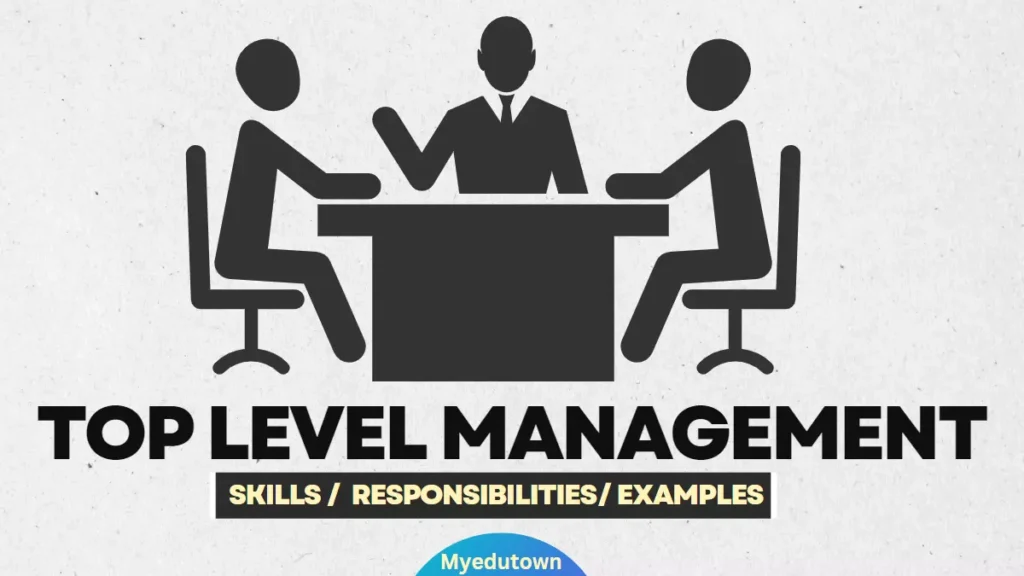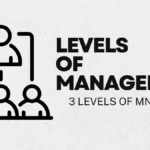If you’re reading this, you’re probably a business leader or aspiring executive looking to learn more about effective leadership and management strategies. Or maybe you’re simply curious about the role of upper management in a business or organization. Either way, you’ve come to the right place!
In this post, we’ll delve into the world of top level management, also known as upper management or senior management. The managers who manage upper-level management are top level managers. We’ll explore the key responsibilities of upper management, as well as provide tips and insights from industry experts on how to excel in these important leadership positions. Whether you’re an experienced executive or just starting out on your management journey, we hope you’ll find this post useful and informative. Top-level management is the highest level of management in any organization.
So, if you want to learn more about top level management and how to effectively lead and manage a business or organization, keep reading!
What is top level management?
Top level management, also known as upper management or senior management, refers to the highest level of executives in an organization. These individuals hold key leadership positions and are responsible for making major decisions and setting the overall strategy for the organization. They are typically responsible for overseeing the operations of the organization and ensuring that it is running efficiently and effectively.
Upper management may include the CEO, president, and vice presidents, as well as other high-level executives such as the CFO, COO, CMO, and CIO. Top level management is responsible for providing leadership and direction for the organization and for making the major decisions that will shape its future.

10 Jobs and Responsibilities of top level management
Each level of management is controlled by their managers so there can be many types of managers on each level. Top-level management is controlled and managed by top-level managers. Here are some important responsibilities of top-level managers.
1. Setting the goals and objectives of the organization
One of the key responsibilities of top-level management is to determine the long-term vision and direction of the organization and to set the goals and objectives that will help the organization achieve its mission. This involves identifying the needs and goals of the organization and its stakeholders and developing a plan to achieve those goals. Upper management is responsible for ensuring that the goals of the organization are clear and achievable, and for communicating those goals to employees and other stakeholders.
Similar Topic: Corporate Social Responsibility
2. Developing and implementing policies, procedures, and programs
Upper management is responsible for developing the policies, procedures, and programs that will guide the activities of the organization. This may involve creating policies that outline the expectations for employee behavior and performance, as well as procedures for completing tasks and achieving goals. Programs may be developed to address specific needs or goals of the organization, such as training programs or initiatives to improve customer satisfaction.
3. Making strategic decisions
Top level management is responsible for making the major decisions that will shape the future of the organization. This may include deciding on the direction the organization will take, making investments in new technology or facilities, and determining how resources will be allocated. Strategic decisions are typically long-term in nature and have a significant impact on the organization. Upper management must consider the potential risks and rewards of each decision, as well as the needs and goals of the organization and its stakeholders.
4. Overseeing the operations of the organization
Upper management is responsible for ensuring that the organization is running efficiently and effectively. This may involve monitoring the performance of individual departments, identifying and addressing any operational issues, and implementing changes as needed. Top level management may also be responsible for developing and implementing plans to improve the efficiency and effectiveness of the organization’s operations. This may include streamlining processes, implementing new technologies, and reorganizing departments.
5. Managing the organization’s resources
Managing the organization’s budget, personnel, and physical assets is one of the important functions top level management. This includes making decisions about how resources will be allocated and ensuring that the organization is using its resources effectively. Upper management must consider the needs of the organization and its stakeholders when allocating resources and must ensure that the organization is maximizing the value of its resources.
6. Working with the board of directors, shareholders, and other stakeholders
Higher management is responsible for maintaining good relationships with the board of directors, shareholders, and other stakeholders and for keeping them informed about the performance of the organization. This may involve providing regular updates on the financial performance of the organization, as well as the progress of key initiatives and projects. Upper management must also consider the needs and concerns of these stakeholders when making decisions that will impact the organization.
7. Providing leadership and direction for the organization
Top level management is responsible for providing guidance and direction for the organization and for inspiring and motivating employees to achieve the goals of the organization. This may involve setting a clear vision and mission for the organization and communicating that vision to employees and other stakeholders. Upper management must also provide support and resources to employees to help them achieve their goals and must be willing to make tough decisions when necessary.
8. Representing the organization to external stakeholders
Upper management is responsible for representing the organization to external stakeholders, such as customers, suppliers, and partners. This may involve negotiating contracts, building relationships, and representing the organization at industry events. Upper management must ensure that the organization is meeting the needs and expectations of these stakeholders and must be able to communicate the value of the organization to these audiences.
9. Ensuring compliance with laws and regulations
Dealing with laws and regulations is one of the functions of top-level management. Top level management is responsible for ensuring that the organization is compliant with all relevant laws and regulations. This may include developing policies and procedures to ensure compliance and addressing any compliance issues that arise. Upper management must be aware of the changing regulatory environment and must ensure that the organization is taking steps to remain compliant. This may involve seeking legal counsel or working with external regulatory agencies.
10. Managing risks
Upper management is responsible for identifying and managing risks that could impact the organization. This may involve developing risk management strategies, implementing controls to mitigate risks, and monitoring and responding to changes in the risk environment. Upper management must be proactive in identifying potential risks and must have plans in place to address those risks if they arise. This may include developing contingency plans, implementing risk management systems, and conducting regular risk assessments. By effectively managing risks, upper management can help ensure the long-term success of the organization.
Skills needed for top level management
There are a number of skills that are important for individuals seeking a job in top level management, also known as upper management or senior management. Some key skills that may be required or beneficial for these positions include:
- Strategic thinking: Upper management is responsible for making major decisions that will shape the future of the organization. Therefore, strong strategic thinking skills are essential for success in these roles. This includes the ability to analyze complex information, identify trends and patterns, and develop long-term plans that align with the goals of the organization.
- Leadership: Top-level management is responsible for providing leadership and direction for the organization. This includes the ability to inspire and motivate employees, set a clear vision for the organization, and make tough decisions when necessary. Strong leadership skills are essential for upper management positions.
- Communication: Upper management must be able to effectively communicate with a wide range of stakeholders, including employees, board members, shareholders, customers, and partners. This includes the ability to clearly articulate ideas, present information effectively, and listen actively to others.
- Interpersonal skills: Upper management must be able to build and maintain relationships with a diverse group of stakeholders. Strong interpersonal skills, including the ability to work effectively in a team, are essential for success in these roles.
- Problem-solving: Upper management is often responsible for identifying and addressing challenges and issues within the organization. Strong problem-solving skills are essential for success in these roles, including the ability to analyze complex problems, develop and evaluate potential solutions, and implement effective solutions.
- Financial management: Many upper management positions involve overseeing the financial performance of the organization. Strong financial management skills, including the ability to analyze financial data and develop financial plans, are important for success in these roles.
- Decision-making: Top level management is responsible for making major decisions that will impact the organization. Strong decision-making skills are essential for these roles, including the ability to analyze complex information, consider the potential risks and rewards of each decision, and make clear and concise decisions.
- Time management: Upper management is often responsible for managing a wide range of tasks and responsibilities. Strong time management skills, including the ability to prioritize tasks and manage workload effectively, are essential for success in these roles.
- Adaptability: Upper management must be able to adapt to change and handle uncertainty. This includes the ability to quickly adjust to new situations and to think on your feet.
- Emotional intelligence: Strong emotional intelligence, including the ability to recognize and manage your own emotions and the emotions of others, is important for success in upper management. This can help you build strong relationships with stakeholders and navigate complex situations effectively.
Interesting Topic >> Benefits of Online Education
Examples of top-level management
These individuals hold key leadership positions and are responsible for making major decisions and setting the overall strategy for the organization. Some common examples of top-level management positions include Presidents Directors, operations directors, marketing directors, finance directors, human resource directors, etc.
- Chief Executive Officer (CEO): The CEO is the highest-ranking executive in an organization and is responsible for overseeing the overall operations of the organization. The CEO sets the overall vision and direction of the organization and is responsible for making major decisions that will impact the organization.
- President: The president is typically responsible for managing the day-to-day operations of the organization and for implementing the strategies and policies set by the CEO. The president may also be responsible for managing relationships with external stakeholders, such as customers, partners, and suppliers.
- Chief Financial Officer (CFO): The CFO is responsible for managing the financial operations of the organization, including budgeting, financial planning, and financial reporting. The CFO works closely with the CEO to ensure that the organization’s financial goals are aligned with its overall strategic objectives.
- Chief Operating Officer (COO): The COO is responsible for managing the day-to-day operations of the organization and for ensuring that the organization is running efficiently and effectively. The COO works closely with the CEO and other top-level executives to develop and implement strategies and policies that will support the long-term success of the organization.
- Chief Marketing Officer (CMO): The CMO is responsible for developing and implementing marketing strategies that will promote the organization’s products or services. The CMO works closely with the CEO and other top-level executives to ensure that marketing efforts are aligned with the overall goals of the organization.
Conclusion
In summary, top-level management plays a crucial role in the success of any organization. These high-level executives are responsible for setting the overall strategy and direction of the organization, making major decisions, and overseeing the operations of the company. Some common examples of top-level management positions include the CEO, President, CFO, COO, and CMO. To excel in these roles, individuals should possess a diverse set of skills, including strong strategic thinking abilities, excellent leadership skills, effective communication, and interpersonal abilities, and the ability to problem-solve and make difficult decisions. In addition, top-level managers should be adaptable, innovative, and culturally competent, and should have a thorough understanding of the business and the industry in which they operate. By leveraging these skills and effectively managing their teams, top-level managers can drive the success of their organizations and lead them to new heights.




